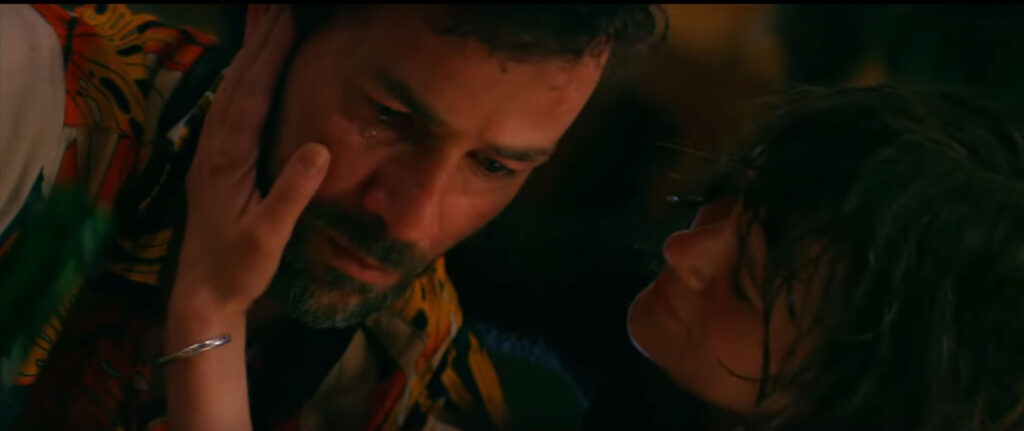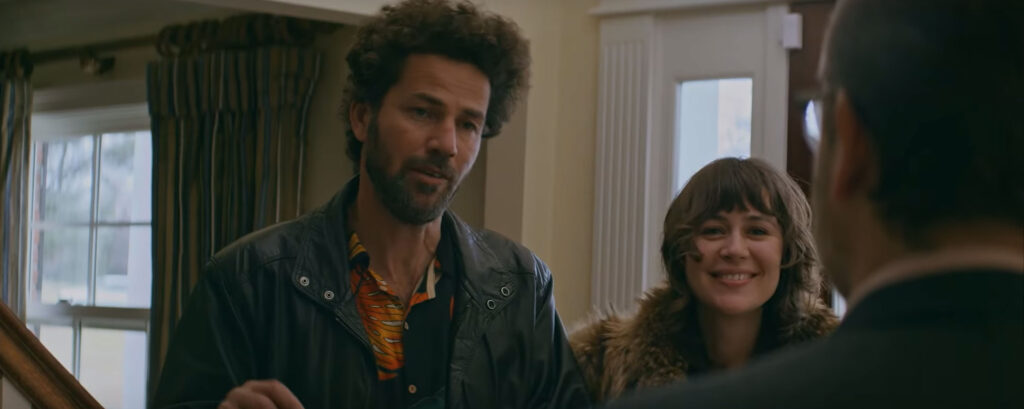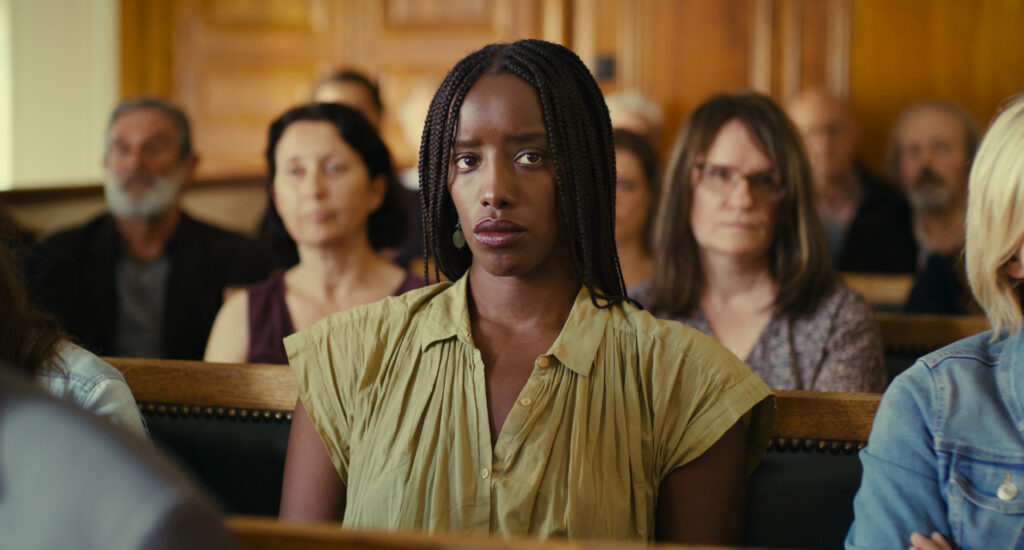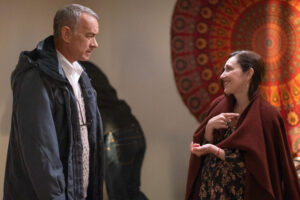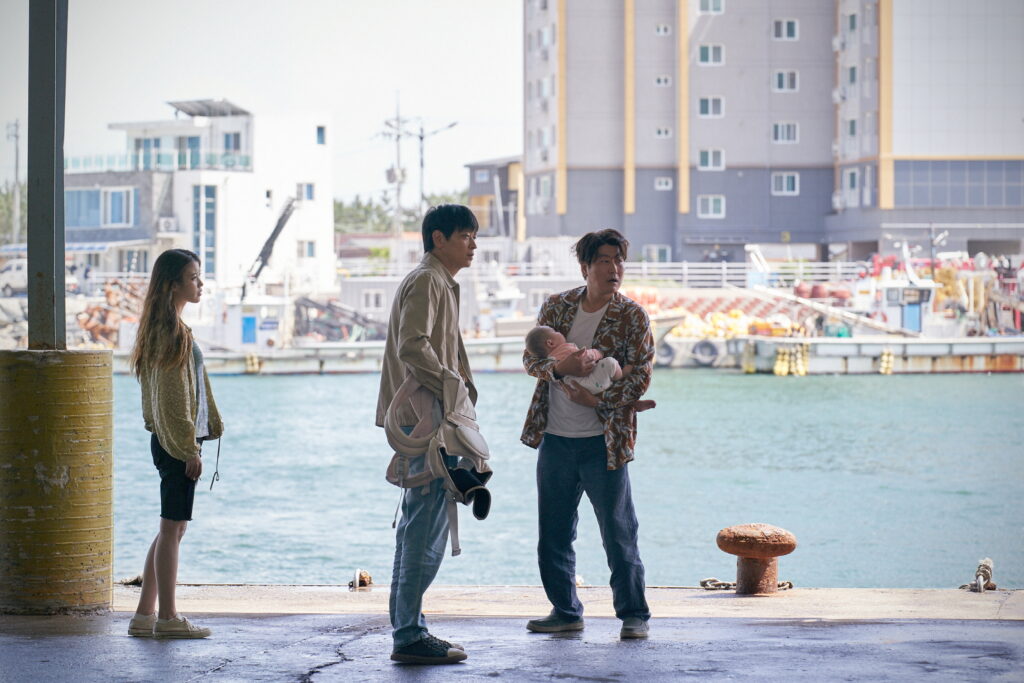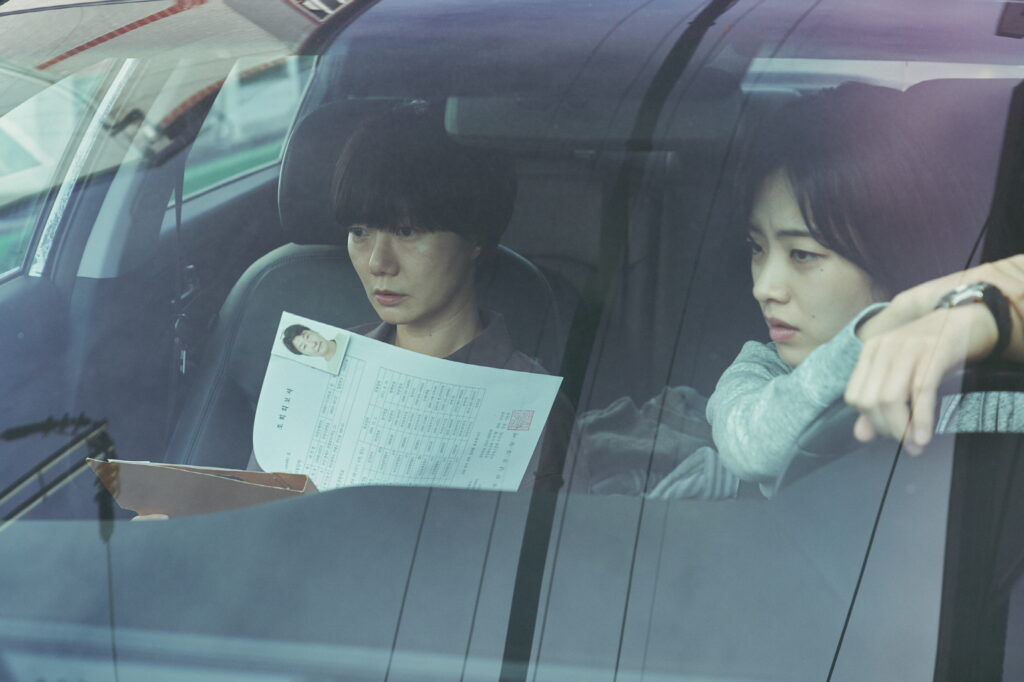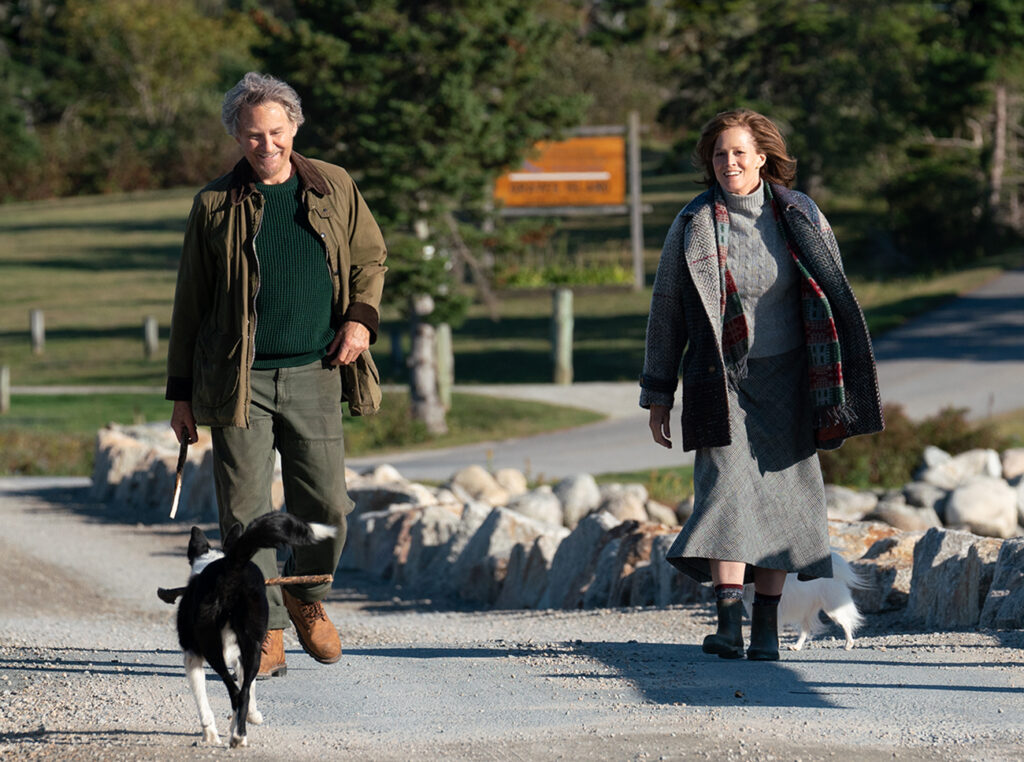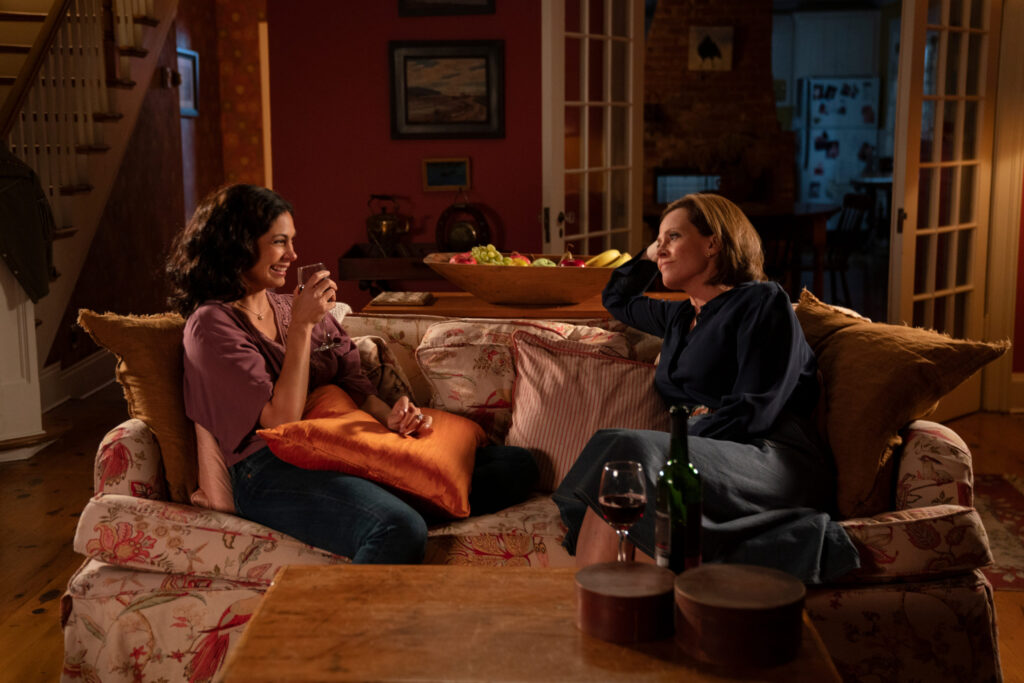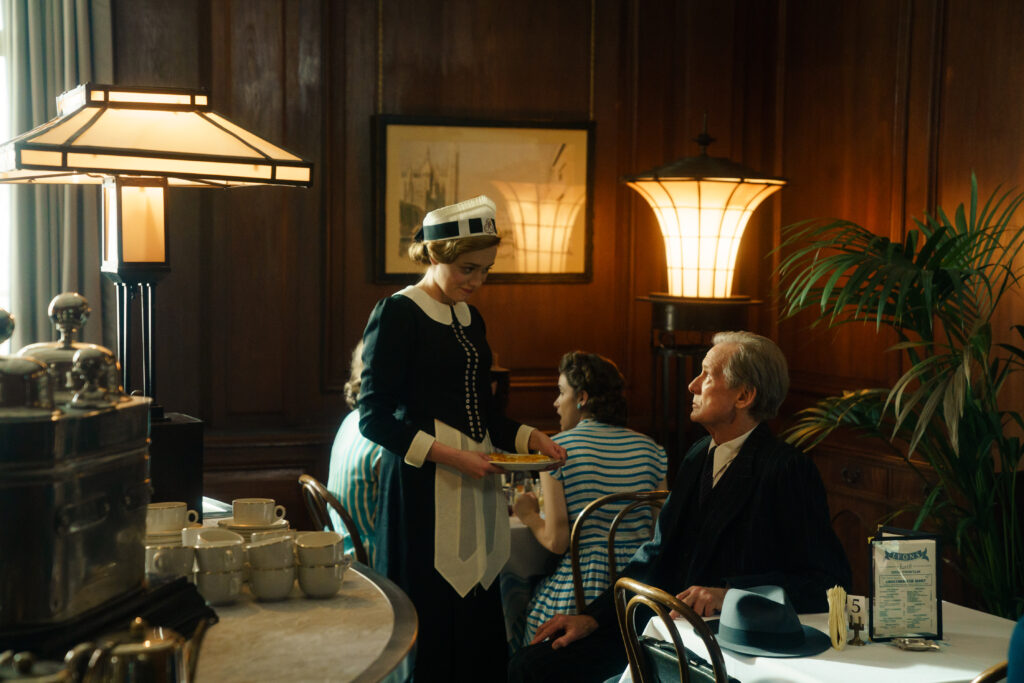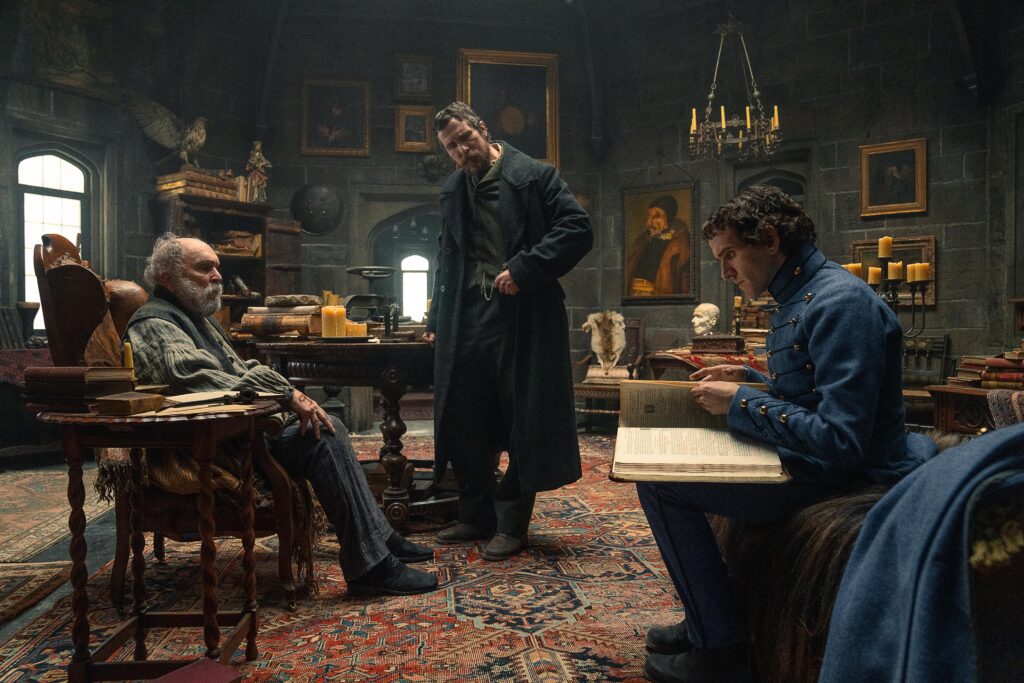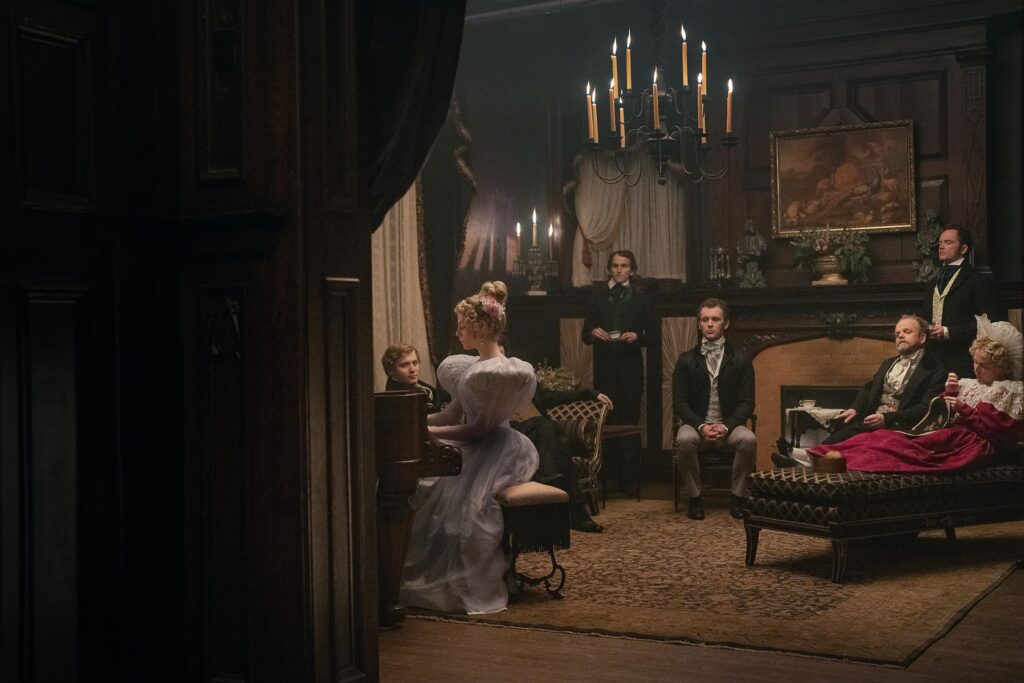January 4, 2023
by Carla Hay

Directed by Katie Holmes
Culture Representation: Taking place in Connecticut and New York City, from March to April 2020, the comedy/drama film “Alone Together” features a predominantly white cast of characters (with a few African Americans) representing the working-class and middle-class.
Culture Clash: During the COVID-19 pandemic lockdowns, a food critic/journalist with an attorney boyfriend finds herself quarantining unexpectedly with a bachelor repairman when they are both double-booked at the same Airbnb rental house, and the awkwardness between these temporary housemates turns into a romantic attraction.
Culture Audience: “Alone Together” will appeal primarily to people who are fans of star/writer/director Katie Holmes and don’t mind watching a clumsily made and extremely predictable romantic dramedy.

“Alone Together” is a trite and misguided dramedy about a would-be couple stuck quarantining in the same house during the COVID-19 pandemic. The only social distancing needed is for viewers to avoid this boring flop that fails to have any romantic sizzle. Katie Holmes is the writer, director and star of this formulaic dud, so she bears the responsibility for not being able to write and direct a great role for herself. The cast members’ performances aren’t terrible, but the movie’s storytelling is so unimaginative and substandard, it’s disappointing that the potential to make a witty and memorable film is completely wasted.
“Alone Together” takes place during a one-month period (March to April 2020), during the COVID-19 pandemic lockdowns. Keep that in mind when the “Alone Together” characters make big decisions about their lives in such a short period of time. The problem is that some of these life decisions don’t look completely believable and look too rushed, considering the personalities of some of the characters involved.
“Alone Together” had its world premiere at the 2022 Tribeca Film Festival. Holmes’ feature-film directorial debut “All We Had” (written by Josh Boone and Jill Killington) had its world premiere at the 2016 Tribeca Film Festival. In both movies, Holmes as a director shows a knack for choosing talented cast members, but she needs a lot of improvement in how a director shapes the narrative of a film.
“Alone Together” is not as muddled as “All We Had” (a drama about a single mother who becomes homeless), but “Alone Together” has almost the opposite problem: It presents complicated life decisions in such an overly simplistic way, the end result is that “Alone Together” looks like an unrelatable, half-baked fairy tale. “Alone Together” earnestly wants to be a meaningful love story set during the COVID-19 pandemic, but the lack of believable chemistry between the two lead characters automatically makes this romantic dramedy a non-starter.
“Alone Together” begins on March 15, 2020, in New York City, at the beginning of the COVID-19 lockdowns. A food critic/journalist named June (played by Holmes) is going on a getaway trip to an Airbnb rental house in Connecticut. Her boyfriend John (played by Derek Luke), who is a corporate attorney, booked this rental the week before, as a romantic vacation. But now, with the world under quarantine from a deadly disease, this trip has taken on a new meaning.
From the beginning, “Alone Together” has a series of contrivances to make June get in a bad mood at the start of the trip. When she goes to the subway station, a homeless panhandler (played by Mike Iveson) verbally abuses her when she ignores his begging for money: “The world is ending, bitch,” the panhandler snarls. “I shouldn’t have to ask you twice.”
The subways are delayed, so June decides to take an above-ground train. But when she gets to the train station, she finds out that the train she needs to take has cancelled all service for the day. June ends up using a Lyft car service to get to her destination, so traveling to the rental home costs a lot more than June expected.
While June uses hand sanitizer in the car (and she continues to use hand sanitizer throughout the movie, to show she’s conscientious about germs), the nosy Lyft driver (played by Neal Benari) inappropriately asks June if she’s married. June says no, but she says she eventually wants to get married and start a family. It’s later mentioned in the movie that June and John have been dating each other for a year.
When she’s in the car on the way to the Airbnb rental, June gets a text from John telling her that he won’t be able to join her at the Airbnb rental, because he’s staying in the city to look after his elderly parents during the COVID-19 lockdowns. The rental house has already been paid for, and June is almost there, so she doesn’t see the point of going all the way back to New York City.
The irritations for June continue: When she arrives at the house, she can’t find the key to the front door. And then, her phone battery dies. She also finds out the house is already occupied by someone who says he booked the same house the day before. You know where this is going, of course.
The house’s other rental occupant is Charlie (played by Jim Sturgess), a bachelor who has his own business repairing vintage items. His especially loves to fix up old motorcycles. And what a coincidence: Charlie lives in New York City too, and he’s rented the house to be by himself during the pandemic lockdowns during the same period time that June and John had the booked the place. June and Charlie predictably have a mild squabble over who has the right to be at the house, until they both agree to share the house for the duration that they have it booked.
“Alone Together” then goes through the tedious and snoozeworthy motions of June and Charlie bickering and being uncomfortable with each other, until they discover they actually like each other and have some romantic attraction to each other. Meanwhile, June is already annoyed with John for wanting to spend time with his parents instead of with her. And then, June gets jealous when she sees a social media photo of John looking cozy with one of John’s female co-workers named Carol.
June tells Charlie about John but almost makes John sound like an inattentive boyfriend instead of a loving and caring son. Charlie has some issues about falling in love because his most recent ex-girlfriend cheated on him and dumped him to be with another man. Even after Charlie tells June this information, she seems to have very little qualms about cheating on unsuspecting John with Charlie. Charlie also doesn’t seem to want to think too much about the consequences if Charlie and June hook up: Charlie is going to be involved with another woman who’s a cheater, and he’s going to be involved in emotionally hurting John.
In other words: “Alone Together” doesn’t give any good reasons for viewers to root for June and Charlie to be a couple. To make things worse, the dialogue in “Alone Together” is so bland and forgettable, it’s hard to believe that June and Charlie are connecting on a level other than physical attraction. It’s supposed to be an “opposites attract” situation where uptight, white-collar June and laid-back, blue-collar Charlie are supposed to find love with each other, despite their different lifestyles. It all looks so phony.
“Alone Together” also has some weird inconsistencies that are examples of the movie’s substandard writing and directing. When June first meets Charlie, she asks him, “Are you from Wisconsin?,” even though he has an obvious East Coast accent. Charlie later tells June that he grew up New York City’s Lower East Side, even though Sturgess (who is British in real life) has an American accent that sounds more like Charlie grew up in New Jersey.
The two-story house where June and Charlie are staying is big enough to have more than one bathroom, but there are multiple, fake-looking scenes where Charlie and June have discomfort from using the same bathroom. June is supposed to be such a germaphobe during the pandemic (before a COVID vaccine is available), she’s paranoid about using towels in someone else’s house. But then, there are multiple scenes of her not social distancing or not using any face protections when she’s around a stranger like Charlie during the pandemic. Charlie eventually makes face masks for himself and June, because it’s supposed to be a cutesy romantic gesture.
Charlie and June eventually open up to each other about their family lives. June’s only living relative is her widowed, unnamed grandfather (played by Ed Dixon), who is the father of June’s mother. There’s a scene where June sings “Blue Moon” to her grandfather when they chat on the phone during the quarantine. (During the movie’s opening credits, Holmes’ real-life daughter Suri Cruise sings a pitch-perfect and delightful version of “Blue Moon,” in one of the few highlights of this dud of a movie.) Charlie is close to his widowed mother Deborah (played by Melissa Leo), and she calls him during the quarantine too.
June’s best friend is named Margaret (played by Zosia Mamet), who tries to assure a worried and insecure June that John wouldn’t cheat on June with his co-worker Carol, because John is a good guy. Meanwhile, hypocritical June gets closer and closer to cheating on John with Charlie. June fails to see this double standard. The characters of June’s grandfather, Charlie’s mother Deborah and June’s friend Margaret are just sounding boards and are ultimately of no consequence to the story.
Even if the trailer for “Alone Together” didn’t already reveal that John (who is a very generic character) would show up unexpectedly at the house, it’s too easy to predict that this is how John will find out about Charlie. The movie then hems and haws with pseudo-suspense, as June has to decide if she will choose John or Charlie in this monotonous love triangle. And remember: June is making this decision after knowing Charlie for less than a month. “Alone Together” is trying desperately to be a smart independent film, but there’s no intelligence to be found from copying the same old tired clichés that can be found in a Hallmark Channel movie or a cheap romance novel.
Vertical Entertainment released “Alone Together” in select U.S. cinemas on July 22, 2022. The movie was released on digital and VOD on July 29, 2022.



